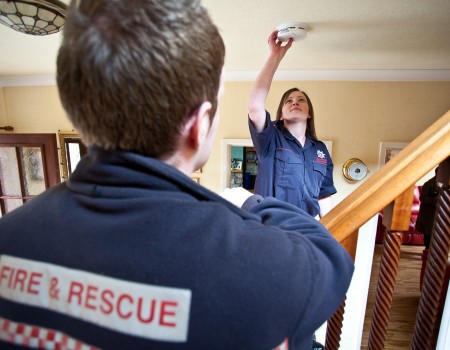Whilst UK fire services are attending fewer incidents than ever before, the threat of house fires and fire related injuries remain a very serious consideration for the home owner. Fire safety might be something that seems tiresome or unnecessary, but every year hundreds of people are injured or even killed in their homes by preventable house fires.
These days, many people are aware of the importance of having a working smoke detector in their home, and whilst having an escape plan and giving serious thought to fire prevention are of paramount importance, the structural aspects of your home need careful attention too. Here’s some pointers to get you thinking seriously about the dangers of a fire in your home:
The Electrical System:
Hiring an electrician is going to be necessary if you intend to throughly check the integrity of your wiring systems, but you can make a start by inspecting the wiring in the attic for pest and water damage, and ensuring all plastic shielding is free from wear and tear.
Older properties may suffer from poor earthing and badly repaired wiring if they’ve been at the mercy of DIY alterations for decades. Old circuit breakers and fuse boxes might not be up to the task of a modern home’s electrical requirements and could potentially catch fire if overloaded. Flickering lamps and constant power surges are a sure sign you need to book a professional investigation of your home’s wiring.
Gas And Heating Systems:
Loose fittings and valves, combined with an old or improperly serviced boiler could provide a potentially lethal fire risk. Combine this with the invisible threat of carbon monoxide, and you’ll want to schedule a regular boiler check by a CORGI registered plumbing professional.
Make Your Appliances Safe
It goes without saying that you should pay particular care and attention to kitchen cleanliness and grease build up around cookers and grills, but it’s also important to make sure your ventilation fans are kept free of debris and grime.
Never “chain” high power items from a single extension lead, and take special care to properly position electric heaters on their own plug socket, and away from soft and flammable surfaces.
As a rule, it’s always best to watch over household appliances whilst they’re working, whether you’re drying clothes or cooking food. Electric blankets should be switched off once warm, and space heaters should never be left on if you leave the house.
Keep Fireplaces Clean
If you own an older property, make sure you have the chimney swept often. Keep the hearth free of soot and flammable debris, and never leave fuel close to the main fire.
Be Cautious When Storing Flammable Materials
If your garage is used to store fuel for the lawn mower, as well as cans of paint thinner and other solvents, you must remove them if they’re sharing space with any source of ignition or heating system.
Organise A Residents Meeting
If you live in a block of flats, you might need to organise a residents meeting and then book a formal fire safety inspection. www.source-fire.com can arrange this, as well as train individuals in fire prevention and emergency marshalling. This should be a top priority in a large block of flats.
Little And Often
Fire safety needn’t be a chore. Instead of going all out and panicking once every five years, consider staying mindful of fire safety and taking weekly checks of your house and environment. One day, it might save your life.
Wendy Lin is a retired university lecturer from the states now living in England. She is the CEO of a finance consultancy company and the co-owner of another company based out of L.A.
